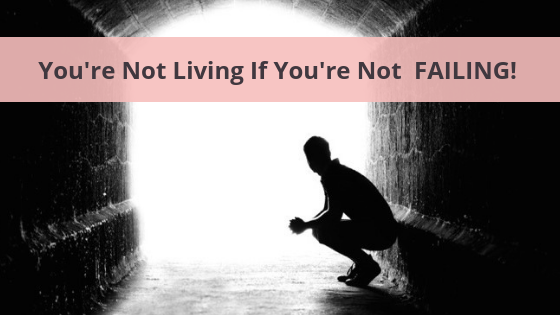
Last month, I was a guest on a podcast, According to Michelle on Mixx106Radio.com, interviewed alongside the CEO of SafeHouse Outreach, Josh Bray. In Josh’s portion of the interview, he made an insightfully profound comment that life is about failing.
That statement struck a chord with me, a note so loud that it still reverberates in my mind to this day. Life is about failing.
Culture teaches us to avoid failure—there is a sting and a shame attached to it. But guess what? You’re not fully living your best life if you haven’t failed.
Think about the number of bad relationships you went through in order to find that right person; the number of jobs you tried and lost before you discovered your true genius; the number of financial risks you took before you landed on a goldmine opportunity; the number of mistakes you made before you became experienced, seasoned, more upright and wise.
The truth is, all of us need those hiccups, bumps, challenges, trials and in some cases, tragedies to grow, become and create. Don’t avoid the sting of failure. Be grateful for it. Because that “sting” suggests that you’re trying, that you’re willing to take risks and go all in and try something new.
Failure doesn’t impose shame. Culture does. But culture doesn’t really care about our individual best interest, does it? Culture gravitates and morphs according to thoughts and ideas of people who are flawed at the core and not always true or just. So, the call is to be brave! Bravely ignore what culture has to say about failure and trust a higher and divine source. Trust a source that speaks to and encourages your creative power through all your failure. Know that failure is a sure path to growth and self-discovery, and self-discovery is the genesis of real, authentic leadership.
You’re not living if you’re not failing!
QUESTIONS TO PONDER:
- What lessons have you learned through your failures?
- What was the BEST mistake you ever made? (Initially it looked like a fail but it turned out to be a win.)
- Think of the most iconic leaders you follow. What were their failures and what were their outcomes?
Leave your comments below and let’s start a dialogue! CLICK HERE to join our #OYO Community and be sure to follow me on social media for daily inspirations.



 A 2023 Nautilus Book Award Silver Winner in the category of self-help and personal growth
A 2023 Nautilus Book Award Silver Winner in the category of self-help and personal growth
One of my most favorite tasks as one of reliability engineer. As a reliability engineer, we were tasked to help prevent failures of critical components to prevent major catastrophic events from occurring, events that could do harm to both individuals and the public. In other words, we were tasked to ensure we could manage risk by putting barriers in place that would prevent failure. But despite all that you do, failures still do occur. Think about your cell phone; despite is craftsmanship, redundancy, and design we still manage to get a “drop call” ( a failure); now and then. But as a reliability engineer, we want to ensure our rate of failure ( number of dropped calls is low over a given period of time) and that the time between failures is as long as possible, we call this the “mean time between failures”. While again, failure will occur ( a dropped call) with want the rate of failure to be low and the mean time between failure to be long ( a dropped called one a month; instead of one per day). So how do we manage failure ( ie manage risk) in our own lives to have these desired outcomes? The first is having a good design to mitigate risk; building in features and characteristics that prevent failure and/or decrease the frequency of occurrence. Methods to do that include the following adequate planning; goal and objective setting; constantly conducting evaluations and assessments of circumstances, learning from others through coaching and mentoring; incorporating lessons learned from previous failures; persevering through failure and maintaining the vision; understanding that all actions have consequences, therefore, they need to be measured, timed and calculated; example do you tell her/him how you really feel and your true wants and desires or do you suffer the emotional pain to preserve the valuable asset you have for the longer term ( in others words; measured actions to mitigate a potential catastrophic failure ) ; letting clear thinking passion and purpose be your guide and not raw emotion–example ..staying on Gods purpose for your life; next quantify the consequences of failure and the lost of a valued asset; use real-time data to forecast potential failure and take corrective measures for avoidance ..example..base decisions and subsequent actions on facts and data and not on blind luck or a whim and finally build in redundancy by formulating an alternative success pathway..example often we give up when the primary success pathway is blocked or inhibited; having a standby alternative can ensure your vision, goal and/or objective is achieved. So failure will occur in any system whether it is a cell phone ( a dropped call); a relationship resulting in a hurting heart and loss of a valued asset, or loss of a loved one due to poor health…but the power is in the prevention, starting first with a good design of strategies to enhance reliability and prevent both the rate of failure and its occurrence. Take it from a reliability engineer…it works….with complex systems or in your individual life.
Spoken like a true engineer!! As always, Garry, thanks for your analysis and process. I do appreciate your insightful words to this blog post. 🙂